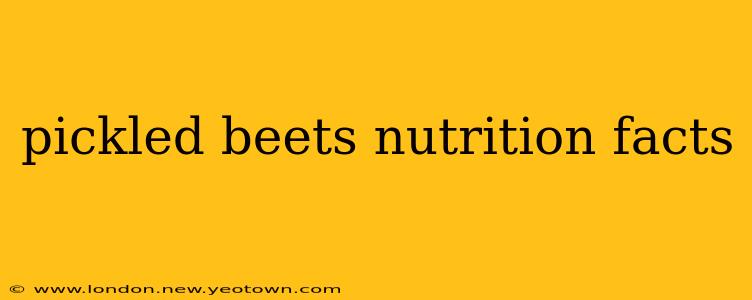The vibrant crimson hue of pickled beets isn't just visually appealing; it signals a treasure trove of nutrients often overlooked. This tangy delicacy, a staple in many cuisines, offers a surprising boost to your health, far beyond its delicious flavor. Let's delve into the nutritional powerhouse that is the pickled beet.
What are the nutritional benefits of pickled beets?
Pickled beets retain many of the beneficial nutrients found in fresh beets, although the pickling process can alter some levels. They're a good source of several vitamins and minerals, including folate, potassium, manganese, and vitamin C. The pickling process itself adds sodium, which is something to be mindful of if you're watching your salt intake.
Think of pickled beets as a delicious, convenient way to sneak extra nutrients into your diet. They offer a satisfying crunch and a unique flavor that complements many dishes. But what specific nutritional benefits can you expect? Let's explore.
Are pickled beets good for you?
Yes, pickled beets offer several health benefits, though it's important to consume them in moderation due to the sodium content.
Here’s a breakdown of the key nutritional advantages:
-
Rich in Antioxidants: Beets, whether pickled or fresh, are packed with antioxidants, particularly betalains, which contribute to their vibrant color. These antioxidants combat oxidative stress, protecting your cells from damage and reducing the risk of chronic diseases.
-
Improved Blood Flow: Nitrates in beets are converted to nitric oxide in the body. Nitric oxide helps relax and widen blood vessels, improving blood flow and lowering blood pressure. This benefit is particularly relevant for those with hypertension.
-
Enhanced Athletic Performance: Studies suggest that beet juice, and by extension, pickled beets, can enhance athletic performance by improving oxygen utilization and endurance.
-
Supports Liver Health: Beets contain compounds that support liver function and detoxification processes.
-
Good Source of Fiber (depending on preparation): While the pickling process might affect the fiber content compared to fresh beets, pickled beets still contribute to your daily fiber intake, aiding in digestion and promoting gut health.
How many calories are in pickled beets?
The calorie count of pickled beets varies depending on the brand and preparation. Generally, a serving (around ½ cup) contains between 20-40 calories. Keep in mind that added sugars in some brands will increase the calorie count.
What are the downsides of eating pickled beets?
While generally healthy, pickled beets come with some caveats:
-
High Sodium Content: The pickling process usually involves a significant amount of salt, contributing to a high sodium content. Individuals with high blood pressure or those watching their sodium intake should consume them in moderation.
-
Potential for Added Sugar: Some brands add sugar to their pickling brine, impacting the overall sugar content and calorie count. Always check the nutrition label before purchasing.
Are pickled beets good for weight loss?
Due to their relatively low calorie count and fiber content, pickled beets can be part of a healthy weight loss diet. However, remember the high sodium content and potential added sugar, which can hinder weight loss efforts if consumed excessively.
Conclusion: Enjoy in Moderation!
Pickled beets offer a delicious and nutritious addition to your diet, providing a range of health benefits thanks to their antioxidant and nitrate content. While enjoying their tangy flavor, remember to consume them in moderation, paying attention to the sodium and sugar content to reap the benefits without compromising your overall health goals.

